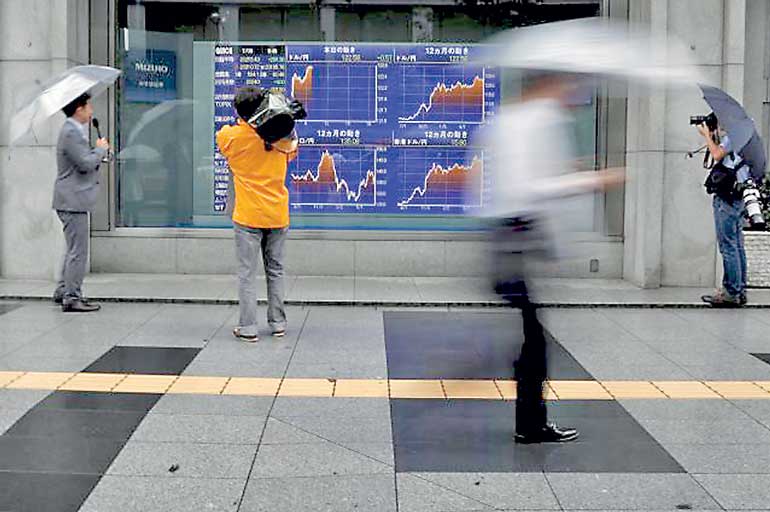Thursday Feb 26, 2026
Thursday Feb 26, 2026
Wednesday, 22 July 2015 00:00 - - {{hitsCtrl.values.hits}}

TOKYO (Reuters): Asian shares gained on Tuesday, taking heart from Nasdaq’s fresh high, while gold prices took back some lost ground after plunging more than 4% to five-year lows in the previous session.
Financial spreadbetters predicted Britain’s FTSE 100 to open about 12 points higher, or up 0.2%; Germany’s DAX to gain 18 points, or 0.2%; and France’s CAC 40 to open flat.
“European equities are set to drift higher tracking overnight gains in the U.S. and Asia,” Jonathan Sudaria, a dealer at Capital Spreads, said in a note.
“Despite the positive start this morning, there’s not a lot of conviction in the move higher. Maybe it’s because we’ve had such a rapid rally since the start of July that the bulls need a breather, or that equities valuations are starting to look a little toppy,” he added.
MSCI’s broadest index of Asia-Pacific shares outside Japan was last up about 0.4%, after wavering between positive and negative territory for much of early trading.
China stocks extended gains as government rescue measures appear to have restored some stability to trading.
Japan’s Nikkei share index ended up 0.9% as markets reopened after a public holiday on Monday, reaching a nearly four-week highs on growing expectations for strong first-quarter earnings.
“Although companies won’t likely change their full-year forecasts this time,” investors are keen to see business plans are on track, said Masayuki Kubota, chief strategist at Rakuten Securities. “Most of them expect to confirm that companies’ earnings are resilient.”
Spot gold added about 0.5% on the day to $1,102.40 an ounce, after what traders described as a mini flash crash in the previous session.
The rout caused concern on Wall Street and kept U.S. share gains in check, though all three major indexes posted modest rises and the Nasdaq Composite still managed to mark its third straight record close. The S&P 500 ended less than 3 points from its record close on 21 May.
“The decline in gold prices is consistent with the drop in the VIX and the rise in equities that took the Nasdaq to a record high,” Kathy Lien, managing director at BK Asset Management said in a note to clients.
“It signals to FX traders that there is a sense of calm in the markets,” she said.
Part of that calm is due to a more stable situation in Greece, where banks reopened as Athens began the process of paying off billions of euros owed to international creditors after it agreed to a new reform plan in exchange for another bailout to keep it in the euro zone.
Investors also have less incentive to hold gold, as the dollar strengthens ahead of an expected increase in U.S. interest rates later this year, the first in nearly a decade.
Underpinning the greenback, St. Louis Fed President James Bullard told Fox Business Network that there was a better than 50% chance that the U.S. central bank will raise interest rates in September.
The dollar jumped to its highest since April 23 against a basket of major currencies, and was last up about 0.1% on the day at 98.111.
The euro edged down slightly on the day to $1.0815, after dipping to its lowest since mid-April overnight.
The dollar added about 0.1% against the yen to buy 124.43 after earlier touching a six-week peak of 124.48 yen.
Oil prices steadied on Tuesday, helped by a dip in the dollar, but were on track for their biggest monthly drop since March in the face of a global supply glut.
A nuclear deal between Iran and the West that is likely to unleash more oil on a market where slowing Chinese growth and a faltering European recovery have eaten into demand and stripped almost 11 percent off the price of crude oil so far in July.
Iranian Supreme Leader Ali Khamenei last week vowed to defy American policies in the region, despite the deal over Tehran’s nuclear program, in a speech U.S. Secretary of State John Kerry on Tuesday called “very disturbing”.
“The Kerry comments are worrying. They suggest implementing the Iran nuclear deal may not be as straightforward as it originally seemed, and may be therefore that Iranian oil exports could reach the market more slowly than expected, perhaps,” said Tamas Varga, analyst at London brokerage PVM Oil Associates.
Varga said he expected the next move for crude to be downwards and saw the next target at $55.60 for Brent.
Brent crude for September LCOc1 was 15 cents lower at $56.50 a barrel by 0825 GMT, after settling 45 cents lower on Monday. Brent has fallen in 10 out of the last 12 months, making this its weakest period since 2008.
U.S. August crude CLc1, set to expire on Tuesday, fell 15 cents to $50.00 a barrel. The front-month contract fell below $50 a barrel on Monday for the first time since April and is down some $9 a barrel for the month.
Last week, the International Energy Agency said it expected global oil demand growth to slow next year to 1.2 million barrels per day (bpd) from 1.4 million this year - far less than needed to balance stubbornly growing supply.